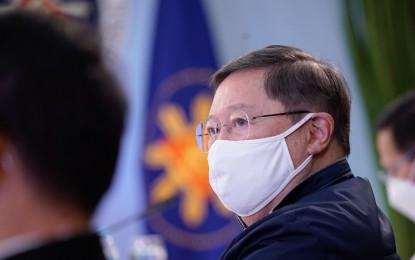
Finance Secretary and Climate Change Commission (CCC) chairman-designate Carlos Dominguez III
GLASGOW – The Philippines will present its newly launched Sustainable Finance Roadmap before policymakers at the 26th United Nations Climate Change Conference of the Parties (COP26) being held here as a model for other emerging economies to incorporate climate and environmental factors in mobilizing funds to build a sustainable and resilient economy.
Finance Secretary and Climate Change Commission (CCC) chairman-designate Carlos Dominguez III said the Roadmap, along with its guiding principles, will serve as the Philippines’ masterplan in formulating green and sustainable policies to raise the capital and investments needed in reducing the country’s greenhouse gas emissions while still increasing its economic output.
“The Roadmap underscores our commitment to deliver on our carbon reduction pledges. We hope this roadmap will inspire other countries towards adopting the appropriate finance policies that will help in the reduction of carbon emissions,” said Dominguez, who heads the Philippine delegation to the COP26.
As its Nationally Determined Contribution (NDC) to the Paris Agreement, the Philippines has committed to a projected greenhouse gas emission reduction and avoidance of 75 percent from 2020 to 2030 for agriculture, wastes, industry, transport, and energy sectors.
Dominguez said the development of the comprehensive Roadmap launched last October 20 underscores the pivotal role that appropriate fiscal policies play in reversing the effects of the climate crisis and in enabling the shift to a low-carbon economy.
The Sustainable Finance Roadmap is the outcome of the Philippines’ partnership with the government of the United Kingdom (UK) in helping the country implement the Asean (Association of Southeast Asian Nations) Low Carbon Energy Program.
The British government supported the establishment of the “Green Force,” which is the Inter-Agency Technical Working Group for Sustainable Finance led by the Department of Finance (DOF) and the Bangko Sentral ng Pilipinas (BSP).
“Finance policies will enable a shift from carbon-intensive to renewable power sources. They will enable greener habitat and transport systems as well as more resilient agricultural practices. This is the reason why we partnered with the Government of the United Kingdom to implement the Asean Low Carbon Energy Program in the Philippines,” Dominguez said.
He said the Philippines’ bold and ambitious NDC requires a whole-of-nation strategy that can only be achieved if the Philippine government starts spearheading the implementation of practical and achievable solutions on the ground.
The Sustainable Finance Roadmap incorporates this whole-of-nation approach in mobilizing finance to support the transition to a clean, sustainable, and climate-resilient economy.
It aims to address policy and regulatory gaps in promoting sustainable investments through finance, implementing sustainable government initiatives, facilitating investments in public infrastructure, and developing projects that promote sustainable financing in the Philippines.
Dominguez said farmers, fisherfolk, and those living in coastal communities bear the brunt of the consequences of climate change in the Philippines.
To help achieve its NDC, the Philippine government has been pushing the swift congressional passage of a bill that will ban single-use plastics, which will encourage every Filipino to do his or her part on a daily basis in reducing marine pollution and helping save the world’s environment, he said.
The Philippine government will also launch here on the sidelines of COP26 a financing mechanism that will allow the Philippines to accelerate its transition from coal to clean energy in a just and affordable manner, Dominguez said.
To provide Filipino farmers adequate protection from crop losses while reinforcing risk mitigation and resilience efforts in the agriculture sector, he said the government is expanding the scope of the assets and crops covered by the Philippine Crop Insurance Corp. (PCIC).
Another significant step that the Philippines has taken as part of its intensified efforts to fight climate change is the appointment of a new National Panel of Technical Experts of the Climate Change Commission (NPTE-CCC).
Dominguez said this new group of experts representing the country’s different regions will provide the government with the practical advice it urgently needs to fight climate change and engage local communities in climate change mitigation and adaptation.
At the October 20 launch of the Sustainable Finance Roadmap, BSP Governor Benjamin Diokno said at least seven local Philippine banks have already issued a total of $1.15 billion and PHP85.4 billion in green, social, and sustainability bonds since 2017.
He said the proceeds from these bonds are being used or will be used to fund and refinance renewable energy, energy efficiency projects, green buildings, green transportation, and sustainable water management, among others.
In October last year, the Philippines’ Department of Energy (DOE) Secretary Alfonso Cusi declared a moratorium on endorsements for greenfield coal power plants to be able to build a more flexible and sustainable power supply mix. (PR)
